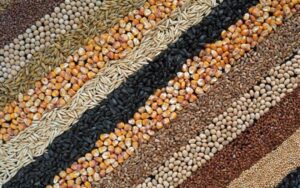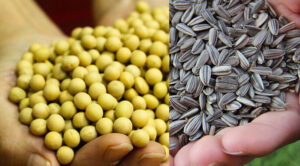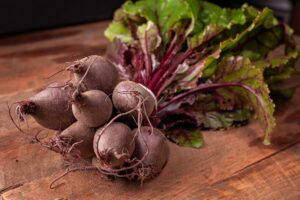
The Poltava Oil Extraction Plant (POEZ) of the Kernel agricultural holding has officially switched to renewable energy sources certified by the international organization Bureau Veritas Group, the company’s press service reported on Facebook.
According to the report, the agricultural holding will fully supply POEZ with renewable energy from sunflower husks, thereby reducing its dependence on fossil fuels and cutting greenhouse gas emissions by more than 11,000 tons per year. In addition, autonomous power generation will ensure continuity of production and reduce risks to food security.
“This is another step towards transforming Ukraine into a sustainable, energy-independent, and innovative country that knows how to turn agricultural resources into strategic advantages. Now our consumers can make an informed choice and contribute to the green recovery of the country’s economy by supporting a producer of certified sustainable oil,” Kernel emphasized.
It is specified that POEZ became the first company in Ukraine’s food sector to join the Science Based Targets Initiative (SBTi). In addition, it intends to support communities and supply surplus “green” energy to Ukraine’s power grid.
“This step is part of Kernel’s efforts to decarbonize and ensure climate resilience at every stage of our work: from the field to logistics,” the agricultural holding summarized.
The Poltava OEZ of the Kernel agricultural holding specializes in the production of sunflower oil under the Stozhar trademark. Previously, oil under this brand was produced in Vovchansk (Kharkiv region). With the start of the full-scale invasion of Ukraine by the Russian Federation, the work of the SEZ in Vovchansk was suspended and its capacities were transferred to the Poltava region. Before the war, the processing capacity of the Vovchansk SEZ was 330,000 tons of sunflower seeds per year. In turn, the Poltava SEZ is designed to process up to 430,000 tons of sunflower seeds per year and produces unrefined, refined, and hydrated vegetable oil, as well as meal.
Before the war, the Kernel agricultural holding company ranked first in the world in the production of sunflower oil (about 7% of world production) and its export (about 12%). It is one of the largest producers and sellers of bottled oil in Ukraine. In addition, it is engaged in the cultivation and sale of agricultural products.
In the first nine months of 2025, Kernel increased its net profit by 7% to $218 million, with revenue growing by 19% to $3.092 billion and EBITDA increasing by 4% to $398 million.

Today, June 12, the Council of the European Union recognized the equivalence of Ukrainian standards for the production of beet, sunflower, rapeseed, and soybean seeds with European requirements, according to the press service of the Council of the EU.
According to this decision, seeds of these crops produced in Ukraine will be able to enter the EU market. This means that EU-based companies will be able to diversify their seed production areas. The new rules will also help to maintain a continuous supply of high-quality seeds to the EU.
“The decision grants equivalence to beet, sunflower, turnip, and soybean seeds produced and certified in Ukraine, fodder plant seeds produced in the Republic of Moldova and officially certified by its authorities, as well as to the corresponding field inspections carried out. The equivalence confirms that the national procedures of the two countries offer the same guarantees regarding seed characteristics and rules for seed examination, identification, and control as those applicable to seeds harvested in the EU,” the statement said.
Moldova has received similar permission for fodder plant seeds.
The decision will enter into force 20 days after its publication in the Official Journal of the EU.

Prime Minister Denys Shmyhal says that 5.6 million hectares of spring cereals and legumes and 7.7 million hectares of industrial crops have been sown in Ukraine.
“Farmers are completing the fourth spring sowing during a full-scale war. 5.6 million hectares of spring grains and legumes have been sown. We have reached last year’s level. The highest sowing rates are in the Poltava, Chernihiv, Vinnytsia, Cherkasy, and Sumy regions,” Shmyhal wrote on Telegram.
According to him, a distinctive feature of this season is an increase in the area under spring wheat, which currently stands at almost 220,000 hectares, due to demand from processing companies and exporters.
“In addition, 7.7 million hectares have been sown with industrial crops, mainly sunflowers (4.9 million hectares) and soybeans (2.3 million hectares),” the prime minister said.
Shmyhal stressed that the total area sown is sufficient to meet domestic food needs and develop export potential.

As of April 4, Ukraine sowed 926 thousand hectares of spring grains and legumes, up 8.7% year-on-year, and started sowing sunflower, the press service of the Ministry of Agrarian Policy and Food reported on Friday.
According to the report, 116.5 thousand hectares were planted with wheat (79.8 thousand hectares a week earlier), 551.8 thousand hectares with barley (315.5 thousand hectares), 164.3 thousand hectares with peas (102.9 thousand hectares), and 82.3 thousand hectares with oats (50.7 thousand hectares).
According to the Ministry of Agrarian Policy, Odesa region is the leader in terms of sowing rates, having sown spring crops on 92.3.1 thou hectares, Ternopil region – 87.4 thou hectares, Poltava region – 83.2 thou hectares, Mykolaiv region – 73.6 thou hectares, Vinnytsia region – 72.6 thou hectares.
In addition, 33 thou hectares have already been planted with sunflower, 64.8 thou hectares with sugar beet, and 2.6 thou hectares with soybeans.
The Ministry reminded that in general, in 2025, it is planned to plant more than 5.7 mln ha of spring grains and legumes, which corresponds to the level of 2024. The main feature of the new season will be an increase in the area under spring wheat by 28%, to 222.8 thou hectares. Such changes in the crop structure are in line with the stable demand from processing companies and exporters.
As reported, as of April 4, 2024, the total area under spring grains and pulses was 852.1 thsd ha. Peas were planted on 119.0 thou hectares, barley – on 543.2 thou hectares, wheat – on 118.3 thou hectares, oats – on 62.4 thou hectares.

Astarta, Ukraine’s largest sugar producer, has already sown more than 60% of the planned sugar beet area and started sowing sunflower, the company’s press service reports on Facebook.
“The minimum moisture reserves in the soil due to the lack of precipitation in the autumn-winter period and rapid spring warming forced us to quickly adapt agricultural technologies to make the most of the favorable sowing windows,” the agricultural holding explained.
According to the report, Astarta has allocated the planned sown areas for strategic crops as follows: sugar beet – 34 thousand hectares, soybeans – 55 thousand hectares (including 3 thousand hectares for seeds), winter wheat – 46 thousand hectares (including 3 thousand hectares for seeds), sunflower – 28 thousand hectares, winter rapeseed – 13 thousand hectares, corn – 13 thousand hectares. The area under organic farming is 2 thou hectares. At the same time, the actual total structure of Astarta’s acreage will be clarified based on the results of the sowing campaign.
“Astarta is a vertically integrated agro-industrial holding company operating in eight regions of Ukraine. It comprises six sugar factories, agricultural enterprises with a land bank of 220 thousand hectares and dairy farms with 22 thousand cattle, an oil extraction plant in Globyno (Poltava region), seven elevators and a biogas complex.
In 2023, the agricultural holding reduced its net profit by 5.0% to EUR 61.9 million, and its EBITDA decreased by 6.1% to EUR 145.77 million, while revenue increased by 21.3% to EUR 618.93 million.

TAS Agro’s southern cluster (Kirovohrad, Vinnytsia and Mykolaiv regions) has started the spring sowing campaign, with a focus on sunflower, which will be planted on 2764 hectares, the company’s press service reported on Facebook.
“The production units are fully provided with seeds, fertilizers, plant protection products, and fuel and lubricants. Modern technological complexes are used in sowing, which increase the accuracy of sowing and increase productivity,” said Andriy Zvarych, director of TAS Agro South LLC.
Meanwhile, preparations for the sowing season are underway in the central, northern and western clusters of TAS Agro. In particular, TAS Agro’s northern cluster in Chernihiv region is currently preparing machinery for the upcoming spring field work. TAS Agro West is completing the pre-sowing soil preparation stage, which involves closing off moisture on an area of 13.5 thousand hectares.
In addition, TAS Agro Center continues to provide comprehensive crop care and conducts regular fertilization of winter wheat using UAN-32 mixed with ammonium thiosulfate.
TAS Agro was established in 2014. Its land bank includes 88 thousand hectares in Chernihiv, Sumy, Kyiv, Vinnytsia, Kirovohrad and Mykolaiv regions. The holding specializes in crop production, with elevators with a capacity of about 250 thousand tons. The livestock business is represented by a cattle herd of 5.5 thousand heads, of which 2.5 thousand heads are dairy cattle.
According to the Opendatabot resource, the company’s revenue in 2023 amounted to UAH 2.588 billion, net profit – UAH 155.842 million, debt – UAH 1.2 billion, assets were estimated at UAH 1.8653 billion, and the number of employees – 129. The authorized capital is UAH 8 thousand.
The agricultural holding is part of the TAS group, founded in 1998. Its business interests include the financial sector (banking and insurance segments) and pharmacy, as well as industry, real estate, and venture capital projects.
The founder of TAS and the beneficiary of the TAS Agro agricultural holding is Sergiy Tigipko.